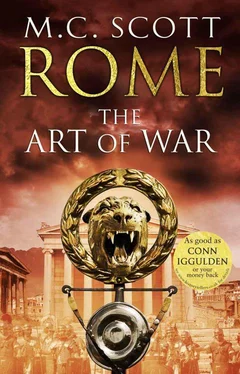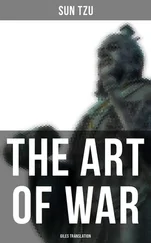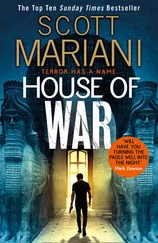M. Scott - The Art of War
Здесь есть возможность читать онлайн «M. Scott - The Art of War» весь текст электронной книги совершенно бесплатно (целиком полную версию без сокращений). В некоторых случаях можно слушать аудио, скачать через торрент в формате fb2 и присутствует краткое содержание. Жанр: Исторические приключения, на английском языке. Описание произведения, (предисловие) а так же отзывы посетителей доступны на портале библиотеки ЛибКат.
- Название:The Art of War
- Автор:
- Жанр:
- Год:неизвестен
- ISBN:нет данных
- Рейтинг книги:3 / 5. Голосов: 1
-
Избранное:Добавить в избранное
- Отзывы:
-
Ваша оценка:
- 60
- 1
- 2
- 3
- 4
- 5
The Art of War: краткое содержание, описание и аннотация
Предлагаем к чтению аннотацию, описание, краткое содержание или предисловие (зависит от того, что написал сам автор книги «The Art of War»). Если вы не нашли необходимую информацию о книге — напишите в комментариях, мы постараемся отыскать её.
The Art of War — читать онлайн бесплатно полную книгу (весь текст) целиком
Ниже представлен текст книги, разбитый по страницам. Система сохранения места последней прочитанной страницы, позволяет с удобством читать онлайн бесплатно книгу «The Art of War», без необходимости каждый раз заново искать на чём Вы остановились. Поставьте закладку, и сможете в любой момент перейти на страницу, на которой закончили чтение.
Интервал:
Закладка:
What did I look like? Well, not a tribune of the Guard, that’s for sure. It had been four months by then since Otho died; that is, since he took his own knife and killed himself so that other men might not have to die in his stead. There never was a man like Otho and I grieve for his loss with every waking day.
Me? Yes… I was perhaps a little taller than the average carter’s assistant, a little broader in the shoulder. All right, a lot broader. I wasn’t going to let my battle fitness go just because I wasn’t training every day in the Guard; there are ways to stay fit that don’t involve wearing lead weights and running up the hills of Rome.
I was dressed like a carter, that’s what counted: a fifth-hand woollen tunic, good strong boots, a hat with a broad brim — and a beard.
The Guard is ever clean-shaven; that beard was my best disguise. My belt was a good one, too: a hand’s breadth of ox-hide that would have cost a fortune in leather-starved Rome where the sacrifices were flayed and their hides sent straight to the tanners and from there straight to the legions.
In any war, the makings of armour become as scarce as food, and this war had grumbled on for over a year now; everything was in short supply. So if nobody looked too closely at the face behind the beard of the carter’s assistant, it was because they envied the breadth of my belt, or were already trying to estimate the worth of the eighty bundles of unwashed fleece in the cart behind, or had been knocked back by the stink of raw lanolin that had the flies dancing in ecstasy for a full three yards all around us.
The carter didn’t know who I was, of course. He didn’t want to find out. We parted as we had joined, with a hand-shake and a nod, not long after the cart had passed through the gate that lies north of Augustus’ tomb.
So that was me, Quintus Aurelius Trabo, formerly a tribune of the Praetorian Guard, now an outlaw with a price on my head, coming home.
So much had changed since I had left, and so little. It was spring when I marched out of the city in the van of Otho’s legions, barely two months after Galba’s assassination.
I’ve searched my conscience over my part in that and I’m not ashamed. It was bloody and vicious and brutal, but even now, I wouldn’t undo any of it. The old man was a martinet, a throwback to the old days of the Republic, a disaster in the making.
Otho, on the other hand, knew how to think, and when to act. He was young, not yet quite forty, and had the resilience, courage and foresight that Rome needed then and, if you’ll take my opinion, she still needs now. He was generous with his money and intelligent about how it was spent. He had honour and battle sense and the ability to talk up or down to the idiots in the senate when they needed it.
When he died, my world died with him, and I’ll admit now that I thought hard about joining him in his honourable oblivion. I might have done it, too, but he had given me a letter to deliver and told me not to return to Rome too soon, to allow some time for things to settle. I knew what he was about, but I promised him I’d do whatever he asked and keeping that promise was one of the two things that brought me back.
The other was just as important. You’ll have heard the rumour that I took an oath over his still-warm body to avenge him? It’s true. That was the reason I carried a knife in the top of each boot and enough gold in the back of my belt to fund a small army, which was exactly what I planned to do.
It was early evening by the time we reached Rome. We’d set off at dawn, but the road had been so bloody slow we’d lost the best part of a day travelling less than ten miles. The first thing I saw when we were through the gates was the way the low sun glanced off the slow summer waters of the Tiber, lighting up the city. A weaker man, or one with less business ahead of him, would have wept at that.
I left the carter more or less at the place where the fire started five years ago. Then, it was all old wood and straw; it’s not at all surprising that it went up in flames. Now, the streets are wide apart and there are water butts at every junction, and gongs to call the Watch if anyone sees so much as a spark.
I wandered round, getting my bearings, and struck off towards the Quirinal, and the Guard barracks that sits at the back of the hill. It had been my home for ten years and I wanted to be near it, even if I couldn’t go in. Plus I had Otho’s blessed letter to deliver. I’d promised that I would do everything I could not to endanger the recipient, so I planned to reconnoitre on the first day, to see if the address was being watched. Daft as it seems now, I hadn’t thought other people would be doing the same.
I listened as I walked; the talk of the streets is always interesting. They were still talking about the lead lottery, of course, or the death lottery as it was becoming known, but there were those, even amongst the merchants, who were still harking back to the fact that the emperor had made Guards of men who were not born and bred in Rome, as if this somehow diminished their own worth — the carters, the drovers, the merchants — as citizens of a great city.
This is old news now, and people are used to it, but back in the summer men were still reeling over the thought that it was possible for the legions to name an emperor outside the city and then give him his prize. That had never been done before, see, and the opinion of the gutter was that it wasn’t a clever thing to have done then. Not any of it.
Everyone hushed up when the Guard came, and fuck me but there were a lot of them — far more than there had been in Nero’s day. They were patrolling in their eights, one after another after another, looking uncomfortable, out of place in a city that wasn’t their home, amongst people who fell silent whenever they walked past.
But they passed by, that’s the point. They were hunting Trabo, tribune of the Guard, and none of them cast a second glance at a bearded carter. I grinned at them like a fool and they stared right through me and walked on. I know how slaves feel, now. There’s a power to that invisibility if you can harness it.
To be safe, I pulled my hat down so the brim shaded my face and struck off through the evening crowds. In summer, the streets fill up at this time; the day’s trading is largely done and the vendors are winding up their awnings and taking their stock into the back rooms to lock it away for the night.
For me, the big difference was that this evening was the first time I’d been in Rome when nobody knew who I was. The crush wasn’t nearly at its height, but even so I was having to push my way through a solid wall of flesh when for the past ten years crowds had just… parted.
I had to remember not to shove the bastards aside in the emperor’s name. I was talking to myself in my head: ‘Stoop, round your shoulders, smile, back away, don’t push, don’t push. Don’t hit him, either. You can’t afford to start a fight.’ It was frustrating, I can tell you. I’m not slippery like Pantera, I’m not naturally given to double-dealing and lies, but I found that if I treated it like a game, it was bearable.
At a certain point, with the sun low on my right, I finally turned up the first shallow slopes of the Quirinal hill.
The stench of dung and rotting vegetables, of old fish and dead dogs, lessened a little as I went up, or I told myself it did, and if it was mostly a lie, I was glad of it.
The taverns here were cleaner, their inmates increasingly more freedmen than slaves, more officers than men. In all senses, the crowds were more colourful, and more than a little drunk. I turned right into a narrow side road lined on either side by neat houses in white limed brick.
Small, self-contained, with few rooms and fewer slaves, these were the widows’ houses, paid for by a gift of Augustus that no emperor had dared revoke. Summer flowers bloomed in tended troughs outside swept doorways. There was no great wealth displayed, but there was a delight in order that made my heart sing.
Читать дальшеИнтервал:
Закладка:
Похожие книги на «The Art of War»
Представляем Вашему вниманию похожие книги на «The Art of War» списком для выбора. Мы отобрали схожую по названию и смыслу литературу в надежде предоставить читателям больше вариантов отыскать новые, интересные, ещё непрочитанные произведения.
Обсуждение, отзывы о книге «The Art of War» и просто собственные мнения читателей. Оставьте ваши комментарии, напишите, что Вы думаете о произведении, его смысле или главных героях. Укажите что конкретно понравилось, а что нет, и почему Вы так считаете.












